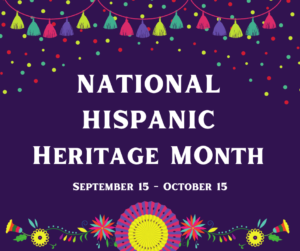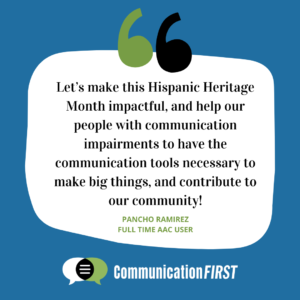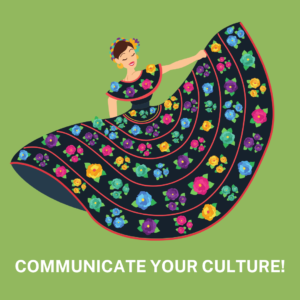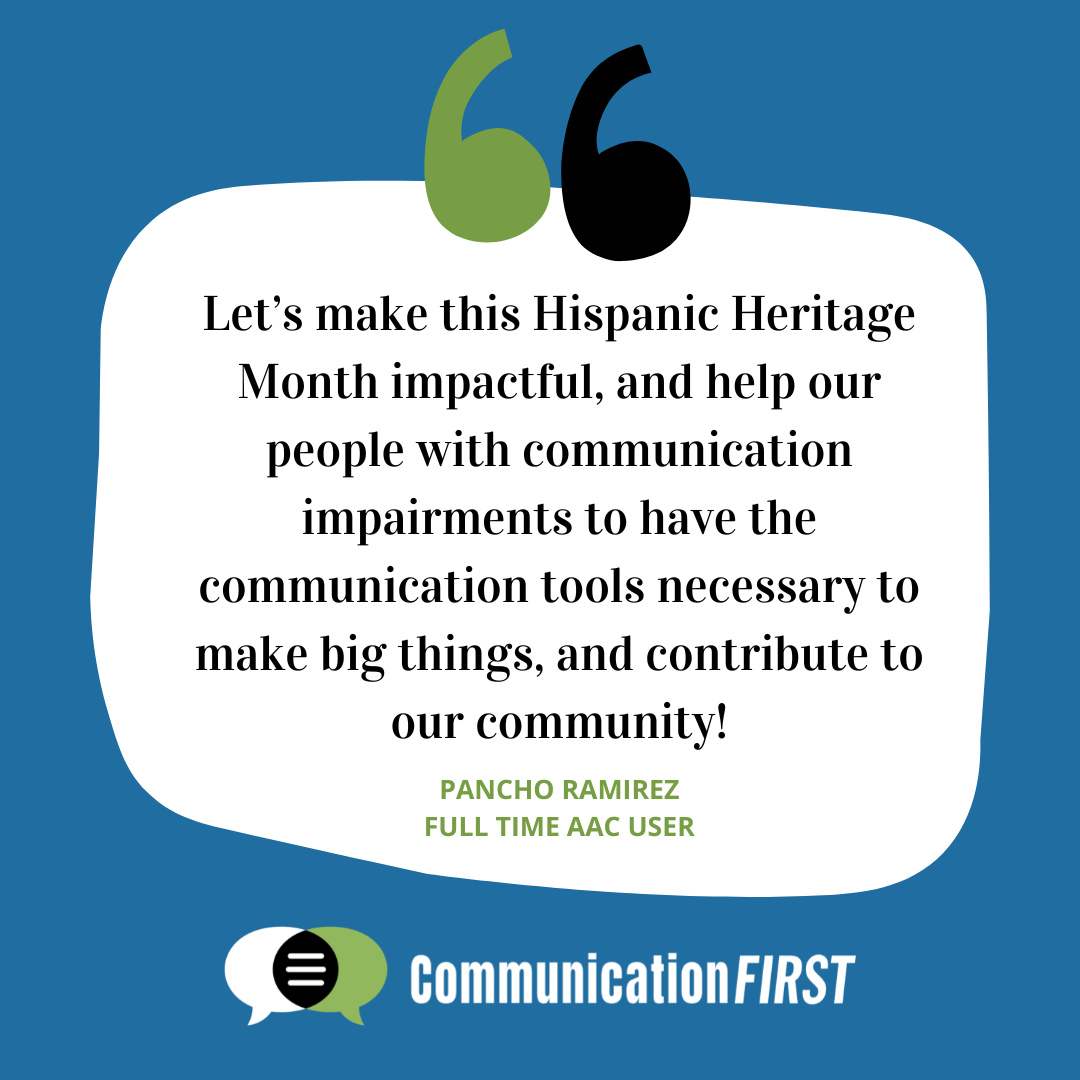How we Communicate our Culture
 September 15 through October 15 is National Hispanic Heritage Month, a month-long celebration to recognize and honor the diverse cultures, histories, and experiences of Hispanic Americans in the United States. (The terms Hispanic and Latinx are not entirely interchangeable, but some people do self-identify as both. The term Hispanic refers to people who speak Spanish and/or are descended from Spanish-speaking countries, while Latinx is typically used to refer to people who are from or descended from people from Latin America.) To help celebrate the contributions that Hispanic Americans continue to make in this country, CommunicationFIRST Board Member Pancho Ramirez and Program Associate Erika Prado discuss what National Hispanic Heritage Month means to them and how communication plays a key role in how they express their culture.
September 15 through October 15 is National Hispanic Heritage Month, a month-long celebration to recognize and honor the diverse cultures, histories, and experiences of Hispanic Americans in the United States. (The terms Hispanic and Latinx are not entirely interchangeable, but some people do self-identify as both. The term Hispanic refers to people who speak Spanish and/or are descended from Spanish-speaking countries, while Latinx is typically used to refer to people who are from or descended from people from Latin America.) To help celebrate the contributions that Hispanic Americans continue to make in this country, CommunicationFIRST Board Member Pancho Ramirez and Program Associate Erika Prado discuss what National Hispanic Heritage Month means to them and how communication plays a key role in how they express their culture.
Pancho: Hello! My name is Pancho Ramirez, I’m from Sonoma, California, living in a nursing home. I cannot speak, nor communicate, without the assistance of technology, or by someone. I am a full-time augmentative and alternative communication (AAC) user, meaning, I use a communication device of some sort, in my case a tablet, for communication purposes.
Erika: Hi! My name is Erika Prado, and I’m from Oxnard, California. I am one of the Program Associates at CommunicationFIRST, and primarily use speech to communicate.
What does National Hispanic Heritage Month mean to you?
Pancho: I think Hispanic Heritage Month is a time to celebrate, to stop and think Hispanic people are here, are there, are everywhere! They contributed so much to this country; they do the work nobody else wants to do, and so they deserve the celebration. Needless to say, not just for the work they do, but for many other things they did, and continue to do. We need to have in mind, however, disabled people. Yes! Hispanic American people with disabilities can contribute to our communities as well, but they need to have all the necessary tools to be able to do it. Especially those individuals who are unable to communicate because of speech-related disabilities.

Communication is essential for every Hispanic American person with disabilities to be successful in life and form part of our community. We need to be able to communicate to go talk with family, friends, bosses, employees, teachers, students, and so on and so forth.
Thus, I believe we have work to do, my Latinx and Hispanic people. Let’s make this Hispanic Heritage Month impactful, and help our people with communication impairments to have the communication tools necessary to make big things, and contribute to our community!
Erika: I completely agree with you, Pancho! To me, like you said, Hispanic Heritage Month is about celebration and also reflection. This is a great time to celebrate our achievements and recognize our important contributions to the United States! It’s also a time to reflect on the efforts of our ancestors and the triumphs and struggles they faced. As the largest minority group in the US (62.1 million and counting!), we have a great effect on this society. It is important to highlight that 1 out of every 6 Hispanic Americans living in the US has a disability. While we celebrate the achievements of Hispanic Americans with disabilities across the country this month, we also need to raise awareness of the struggles they continue to experience in the US. Unfortunately, Hispanic Americans with disabilities face various forms of discrimination that stem from systemic issues such as racism, ableism, linguistic discrimination, etc. It’s a good reminder that there is still much work left to do!
How do you like to communicate your culture?
Pancho: As someone who was born in Mexico, and as an AAC user, having a way to communicate and gather with family and friends to discuss our culture is a big deal. Although I cannot speak with my natural voice, I have my tablet to be my assistant speaker. I feel so fortunate to have a tablet and being able to communicate and talk about my Mexican culture, to express my feelings and thoughts, to have a voice and be understood; I was able to go to college, earn my GED and web-development certificate because of that. Now, I can follow my dreams and work to be self-sufficient and provide for myself. To me, every Hispanic American individual who is unable to speak should have an AAC device to communicate, because having the right communication tool is a must-have for everyone who is unable to rely on speech itself. Not just during Hispanic Heritage Month, but for their whole lives.
Erika: That’s so true, Pancho! Having a wide variety of resources and tools to communicate is essential when communicating who you are to the world – not just this month, but all year long! I think there’s nothing like communicating our culture on Mexican Independence Day! On the evening of September 15, my family and I typically head down to la plaza (downtown) and take part in El Grito, a tribute to the battle cry for Mexican independence that took place on September 16, 1810, by Miguel Hidalgo y Costilla. On this day, we communicate our Mexican culture through much more than speech. We communicate our culture through food, music, dance, traditional clothing, hairstyles, and so much more!
What does your culture mean to you?
 Pancho: I enjoy being a Latino and I love to eat my authentic Mexican food. And as a good Mexican, spicy hot, NO, so very hot. With just moderate spiciness, it loses its flavor, I think. When Mexican Independence Day comes, there’s a beautiful celebration here in Sonoma. I head downtown in my motorized wheelchair with my AAC device, my sister, and her husband. We watch people do great performances, dancing wearing beautiful costumes, while eating and listening to live music. Sometimes, we have some discussions about Mexican Independence Day and Hispanic Heritage Month, and why these two festivities are celebrated on almost the same day. We agree with some facts and disagree with other ones. I’m very proud that I can get involved in such conversations. I think it’s very important for a person who doesn’t speak to be able to participate in this, family, friends and community conversations. Everybody has thoughts and ideas to share. Unfortunately, not every Hispanic American individual who doesn’t speak can afford an AAC device. Note! I couldn’t possibly afford mine, as well, but I had the fortune to be helped by the right people, who guided me, to have the government and insurance pay for it. They should do the same, you should do the same, as I did, find help, because everyone has the right to communicate, and everyone should have the right to own an AAC device! So they can communicate their culture and be part of the conversation.
Pancho: I enjoy being a Latino and I love to eat my authentic Mexican food. And as a good Mexican, spicy hot, NO, so very hot. With just moderate spiciness, it loses its flavor, I think. When Mexican Independence Day comes, there’s a beautiful celebration here in Sonoma. I head downtown in my motorized wheelchair with my AAC device, my sister, and her husband. We watch people do great performances, dancing wearing beautiful costumes, while eating and listening to live music. Sometimes, we have some discussions about Mexican Independence Day and Hispanic Heritage Month, and why these two festivities are celebrated on almost the same day. We agree with some facts and disagree with other ones. I’m very proud that I can get involved in such conversations. I think it’s very important for a person who doesn’t speak to be able to participate in this, family, friends and community conversations. Everybody has thoughts and ideas to share. Unfortunately, not every Hispanic American individual who doesn’t speak can afford an AAC device. Note! I couldn’t possibly afford mine, as well, but I had the fortune to be helped by the right people, who guided me, to have the government and insurance pay for it. They should do the same, you should do the same, as I did, find help, because everyone has the right to communicate, and everyone should have the right to own an AAC device! So they can communicate their culture and be part of the conversation.
Erika: Exactly! Everyone should have the right to be a part of the conversation! And in the language they want to, as well! As a daughter of Mexican immigrants, I celebrate my culture, my language, and my experiences not just this month, but every day! I’ve been raised here in the United States by wonderful parents who have surrounded me with beautiful Mexican traditions and customs. To me, language is a huge part of culture. One thing I am grateful for is learning Spanish as my first language, which has enabled me to expand the number of potential communication partners I can have. The Spanish language is the language of family: it’s the way I communicate with my parents, sister, grandparents, cousins, etc. Even my dog, Memo (yes, named after Mexican goalkeeper, Memo Ochoa)! For this reason, I cherish this language. If I didn’t have access to Spanish, I wouldn’t understand the funny joke my uncle said at the dinner table when we were all eating tamales during las posadas. Or I would miss out on all the stories my grandmother tells me about her childhood. The ability to communicate in the Spanish language is vital to me and my identity as a Mexican American. This is why I believe everyone should have the right to communicate in the language that they love, in the language that means family to them. One of the many things I’m most excited about doing at CommunicationFIRST is advocating for bilingual access to AAC so that all multilingual AAC users are supported in their native languages and can participate in their communities in ways that are true to themselves and their culture.

